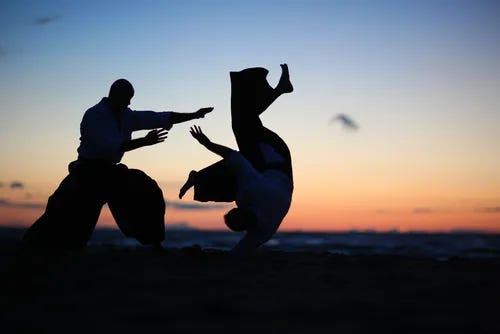In the tumultuous arena of global leadership, where elected and self-appointed figures seem to dismantle established systems, a unique opportunity emerges—akin to executing an aikido move on the grand stage of world affairs. The inadvertent destruction of societal structures by those at the helm presents a chance for individuals and communities to transmute this energy, redirecting the momentum toward shaping a world aligned with our collective aspirations.
Undoubtedly, the magnitude of this task is formidable. While only a select few may possess the capacity to actively participate and lead at this level, the wisdom of an age-old adage resonates: "It only takes 3.5% active participation to create a movement and bring about change."
In the above video exploration, I delve into the signs heralding the arrival of a monumental global shift. The time has come to contemplate alternative strategies for navigating a world in the throes of collapse.
Amidst the geopolitical chessboard, it is apparent that national and global leaders harbor intentions that threaten the very fabric of our societies—invoking invasion, violence, and the breakdown of societal norms. While systems are ostensibly in place, the imperative lies not just in fortifying physical structures but, more crucially, in mentally, emotionally, and psychologically preparing ourselves for the challenges that lie ahead.
As the specter of violence attempts to cast its shadow over cities and communities, the pivotal question emerges: how do we respond? Succumbing to a violent system perpetuates the cycle, while crumbling into chaos only serves to fall into the trap meticulously laid out. It is of utmost importance that we resist becoming pawns in this orchestrated chaos and approach the impending challenges with a conscious, deliberate direction. Now, more than ever, the call to explore uncharted tactics resonates as we stand at the crossroads of a shifting world.
Nonresistance is one of the principles of aikido. Because there is no resistance, you have won before even starting. People whose minds are evil or who enjoy fighting are defeated without a fight.
Morihei Ueshiba
In navigating the labyrinth of these transformative times, I find myself drawn to the profound wisdom encapsulated in the martial art known as aikido—a philosophy that unveils the secrets of harnessing momentum amidst chaos and redirecting the forces shaping our world.
AIKIDO POLITICO
Aikido is a martial art that emphasizes using an opponent's energy and movements against them, rather than relying on brute force. While it is primarily a self-defense martial art, some principles from aikido can be metaphorically applied to social situations, including the breakdown of society. Here are a few ways in which aikido principles can be considered in this context:
Harmony and Cooperation:
Aikido emphasizes the concept of "aiki," which means blending or harmonizing with an opponent's energy. In the context of societal breakdown, promoting harmony and cooperation among individuals and groups can help prevent conflicts from escalating. Encouraging dialogue, understanding, and finding common ground can be valuable in fostering a more cohesive society.
Adaptability:
Aikido practitioners are trained to be adaptable and responsive to changing situations. In the face of societal challenges, being open to change and adapting to new circumstances can be crucial. Flexibility in policies, social structures, and attitudes can contribute to the resilience of a society.
Non-Resistance and Non-Confrontation:
Aikido teaches the principle of non-resistance, where practitioners avoid direct confrontation with an opponent's force. In a societal context, this could mean finding peaceful solutions to conflicts, addressing root causes, and avoiding the escalation of tensions. Non-violent communication and conflict resolution techniques may be helpful in this regard.
Redirecting Energy:
Aikido techniques involve redirecting an opponent's energy rather than meeting it head-on. In a societal breakdown, this could be metaphorically applied by redirecting negative energies and frustrations toward constructive outlets. Encouraging individuals to channel their energy into positive actions, such as community service or creative endeavors, can contribute to rebuilding a sense of purpose and community.
Mindfulness and Presence:
Aikido places importance on being present and mindful in the moment. In a societal breakdown, promoting mindfulness and awareness can help individuals and communities better understand the challenges they face. Mindfulness practices can contribute to better decision-making and a deeper understanding of the interconnectedness of individuals within a society.
Respect for Others:
A fundamental aspect of Aikido is respect for one's training partners and opponents. In a societal context, fostering respect for diversity, different opinions, and individual rights can contribute to a more inclusive and tolerant society.
Aiki is not a technique to fight with or defeat an enemy. It is the way to reconcile the world and make human beings one family.
Morihei Ueshiba
If you find these interviews and articles informative, please become a paid subscriber for under 17¢ a day. I don’t believe in paywalls, but this is how I make a living, so any support is appreciated. Either way…. it’s available to you….















Share this post